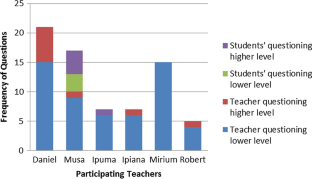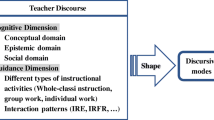Abstract
Developing learners’ critical thinking skills through inquiry-based teaching has been an important aspect of science education. This is an exploratory study aimed at investigating the practice of inquiry-based teaching in schools that use a foreign language (English) in teaching science content. To address the issue, we conducted video observations of six teachers from four community secondary schools in Iringa municipality, Tanzania, for approximately 16 h. These six teachers and 18 students were interviewed after reviewing the clips. In our video study, we noted three major barriers to students’ development of critical thinking skills—teachers’ knowledge and beliefs regarding the nature of scientific knowledge, a classroom culture that does not support students’ development of critical thinking skills and the use of the language of instruction that is not well mastered by both teachers and students.








Similar content being viewed by others
References
Bakahwemama, J. (2016). Change of language of instruction for science and mathematics in grade five in Zanzibar. (PhD), Oslo University.
Baker, C., & Jones, S. (1998). Encyclopedia of bilingualism and bilingual education. Multilingual Matters.
Bissell, A. N., & Lemons, P. P. (2006). A new method for assessing critical thinking in the classroom. BioScience, 56(1), 66–72. https://doi.org/10.1641/0006-3568(2006)056[0066:ANMFAC]2.0.CO;2.
Brock-Utne, B. (2007). Learning through a familiar language versus learning through a foreign language—A look into some secondary school classrooms in Tanzania. International Journal of Educational Development, 27(5), 487–498. https://doi.org/10.1016/j.ijedudev.2006.10.004.
Carlsen, W. S. (1991). Questioning in classrooms: A sociolinguistic perspective. Review of Educational Research, 61(2), 157–178. https://doi.org/10.3102/00346543061002157.
Chin, C. (2007). Teacher questioning in science classrooms: Approaches that stimulate productive thinking. Journal of Research in Science Teaching, 44(6), 815–843. https://doi.org/10.1002/tea.20171.
Chin, C., & Brown, D. E. (2002). Student-generated questions: A meaningful aspect of learning in science. International Journal of Science Education, 24(5), 521–549. https://doi.org/10.1080/09500690110095249.
Crawford, B. A. (2014). From inquiry to scientific practices in the science classroom. In N. Lederman & S. Abell (Eds.), Handbook of research on science education (Vol. II, pp. 515–541). New York, NY: Routledge.
Derry, Sharon J., Pea, Roy D., Barron, Brigid, Engle, Randi A., Erickson, Frederick, Goldman, Ricki, et al. (2010). Conducting Video Research in the Learning Sciences: Guidance on Selection, Analysis, Technology, and Ethics. Journal of the Learning Sciences, 19(1), 3–53. https://doi.org/10.1080/10508400903452884.
Driver, R., Asoko, H., Leach, J., Scott, P., & Mortimer, E. (1994). Constructing scientific knowledge in the classroom. Educational Researcher, 23(7), 5–12.
Erickson, F. (2006). Definition and analysis of data from videotape: Some research procedures and their rationales. In J. L. Green, G. Camilli, & P. B. Elmore (Eds.), Handbook of complementary methods in education research (Vol. 3, pp. 177–192). Washington DC: Erlbaum.
Jewitt, C. (2012). An introduction to using video for research. In E.S.R.C. (Ed.), National centre for research methods working paper.
Kipnis, M., & Hofstein, A. (2008). The inquiry laboratory as a source for development of metacognitive skills. International Journal of Science and Mathematics Education, 6(3), 601–627. https://doi.org/10.1007/s10763-007-9066-y.
Klette, K. (2009). Challenges in strategies for complexity reduction in video studies. Experiences from the PISA + study: A video study of teaching and learning in Norway. In T. Janik & T. Seidel (Eds.), The power of video studies in investigating teaching and learning in the classroom (pp. 61–82). New York: Waxmann Publishing Co.
Kurfiss, J. G. (1988). Critical thinking: Theory, research, practice, and possibilities. ASHE-ERIC Higher Education Report No. 2, 1988: ERIC.
Lai, E. R. (2011). Critical thinking: A literature review. Pearson’s Research Reports. Retrieved 28 August 2017 from http://images.pearsonassessments.com/images/tmrs/CriticalThinkingReviewFINAL.pdf.
Mathews, S. R., & Lowe, K. (2011). Classroom environments that foster a disposition for critical thinking. Learning Environments Research, 14(1), 59–73. https://doi.org/10.1007/s10984-011-9082-2.
Miri, B., David, B.-C., & Uri, Z. (2007). Purposely teaching for the promotion of higher-order thinking skills: A case of critical thinking. Research in Science Education, 37(4), 353–369. https://doi.org/10.1007/s11165-006-9029-2
Mkimbili, S. (2018). Learner-centred science teaching in community secondary schools in Tanzania. Ph.D. thesis. University of Oslo.
Mkimbili, S., Tiplic, D., & Odegaard, M. (2017). The role played by contextual challenges in practicing inquiry-based science teaching in Tanzania secondary schools. African Journal of Research in Mathematics, Science and Technology Education, 21(2), 1. https://doi.org/10.1080/18117295.2017.1333752.
MoEC. (1995). Education and training policy. Dar es Salaam: Ministry of Education and Culture.
MoEVT. (2005). Curriculum for ordinary level secondary education education in Tanzania (978-9976-61-357-5). Dar es Salaam: Tanzania Institute of Education. Retrieved from http://emaktaba.co.tz/material/details/276.
MoEVT. (2014). Sera ya elimu na mafunzo. Dar es Salaam: MoEVT Retrieved from https://www.tanzania.go.tz/egov_uploads/documents/SERA_ya_Elimu_2_sw.pdf.
Msimanga, A., & Lelliott, A. (2014). Talking science in multilingual contexts in South Africa: Possibilities and challenges for engagement in learners’ home languages in high school classrooms. International Journal of Science Education, 36(7), 1159–1183. https://doi.org/10.1080/09500693.2013.851427.
Nikula, T. (2010). Effects of CLIL on a teacher’s classroom language use. In C. Dalton-Puffer, T. Nikula & U. Smit U. (Eds). Language Use and Language Learning in CLIL classrooms (pp 105–124). Amsterdam: John Benjamins Publishing Company.
Ødegaard, M., Haug, B., Mork, S. M., & Sørvik, G. O. (2014). Challenges and support when teaching science through an integrated inquiry and literacy approach. International Journal of Science Education, 36(18), 2997–3020. https://doi.org/10.1080/09500693.2014.942719.
Ødegaard, M., & Klette, K. (2012). Teaching activities and language use in science classrooms. In D. Jorde & J. Dillon (Eds.), Science education research and practice in Europe (pp. 181–202). Rotterdam: Sense Publishers.
Ogunniyi, M., & Rollnick, M. (2015). Pre-service science teacher education in Africa: Prospects and challenges. Journal of Science Teacher Education, 26(1), 65–79. https://doi.org/10.1007/s10972-014-9415-y.
Oliveira, A. W. (2010). Improving teacher questioning in science inquiry discussions through professional development. Journal of Research in Science Teaching, 47(4), 422–453. https://doi.org/10.1002/tea.20345.
Probyn, M. (2006). Language and learning science in South Africa. Language and Education, 20(5), 391–414. https://doi.org/10.2167/le554.0.
Rollnick, M. (2000). Current issues and perspectives on second language learning of science. Studies in Science Education, 35(1), 93–121. https://doi.org/10.1080/03057260008560156.
Schweisfurth, M. (2011). Learner-centred education in developing country contexts: From solution to problem? International Journal of Educational Development, 31(5), 425–432. https://doi.org/10.1016/j.ijedudev.2011.03.005.
Tarmo, A. (2016). Pre-service science teachers’ epistemological beliefs and teaching reforms in Tanzania. Cogent Education, 3(1), 1178457. https://doi.org/10.1080/2331186X.2016.1178457.
Ünsal, Z., Jakobson, B., Molander, B.-O., & Wickman, P.-O. (2016). Science education in a bilingual class: Problematising a translational practice. Cultural Studies of Science Education, 1–24. https://doi.org/10.1007/s11422-016-9747-3.
Ünsal, Z., Jakobson, B., Molander, B.-O., & Wickman, P.-O. (2017). Language Use in a Multilingual Class: A Study of the Relation Between Bilingual Students’ Languages and Their Meaning-Making in Science. Research in Science Education, 1–22. https://doi.org/10.1007/s11165-016-9597-8.
Vavrus, F., Bartlett, L., & Salema, V. (2013). Introduction. In F. Vavrus & L. Bartlett (Eds.), Teaching in tension: International pedagogies, national policies, and teachers’ practices in Tanzania (Vol. 1, pp. 1–22). Rotterdam: Sense Publishers.
Wandela, E. L. (2014). Tanzania post-colonial educational system and pespectives on secondary education, pedagogy and curriculum: A qualitative study. (Ph.D.), DePaul University.
Webb, T., & Mkongo, S. (2013). Classroom discourse. In F. Vavrus & L. Bartlett (Eds.), Teaching in tension: International pedagogies, national policies and teachers’ practices in Tanzania (pp. 149–168). Rotterdam: Sense Publishers.
Wellington, J., & Osborne, J. (2001). Language and literacy in science education. Buckingham: Open University Press.
Zimbardi, K., Bugarcic, A., Colthorpe, K., Good, J., & Lluka, L. (2013). A set of vertically integrated inquiry-based practical curricula that develop scientific thinking skills for large cohorts of undergraduate students. Advances in Physiology Education, 37, 303–315. https://doi.org/10.1152/advan.00082.2012.
Author information
Authors and Affiliations
Corresponding author
Additional information
Publisher's Note
Springer Nature remains neutral with regard to jurisdictional claims in published maps and institutional affiliations.
Lead Editor: E. Afonso Nhalevilo.
Rights and permissions
About this article
Cite this article
Mkimbili, S.T., Ødegaard, M. Inquiry-based science teaching in community secondary schools in Tanzania: role played by the language of instruction. Cult Stud of Sci Educ 15, 1121–1142 (2020). https://doi.org/10.1007/s11422-020-09973-9
Received:
Accepted:
Published:
Issue Date:
DOI: https://doi.org/10.1007/s11422-020-09973-9




